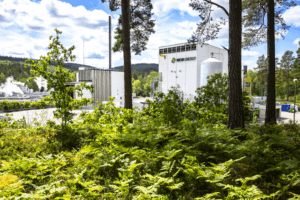Decarbonising metal production: Replacing fossil gas with renewable biosyngas

The metal industry contributes to 7–9% of global CO₂ emissions, ranking among the most energy-intensive sectors. Processes like smelting and reheating require extremely high temperatures, often achieved using fossil fuels such as coal and natural gas. These energy sources offer reliability and precision, but at a significant environmental cost. As the EU intensifies climate action through regulations like the Carbon Border Adjustment Mechanism (CBAM), the pressure increasing on the metal industry to decarbonise without compromising production quality or efficiency.
This article explores how biomass gasification can contribute to the decarbonisation of high temperature process heat in industrial production, such as metal manufacturing, with a particular focus on a case study from Elcowire’s copper production site in Helsingborg, Sweden, where fossil natural gas will be replaced with renewable biosyngas in its melting process.
Understanding biomass gasification
Biomass gasification is an energy-efficient process that...
















